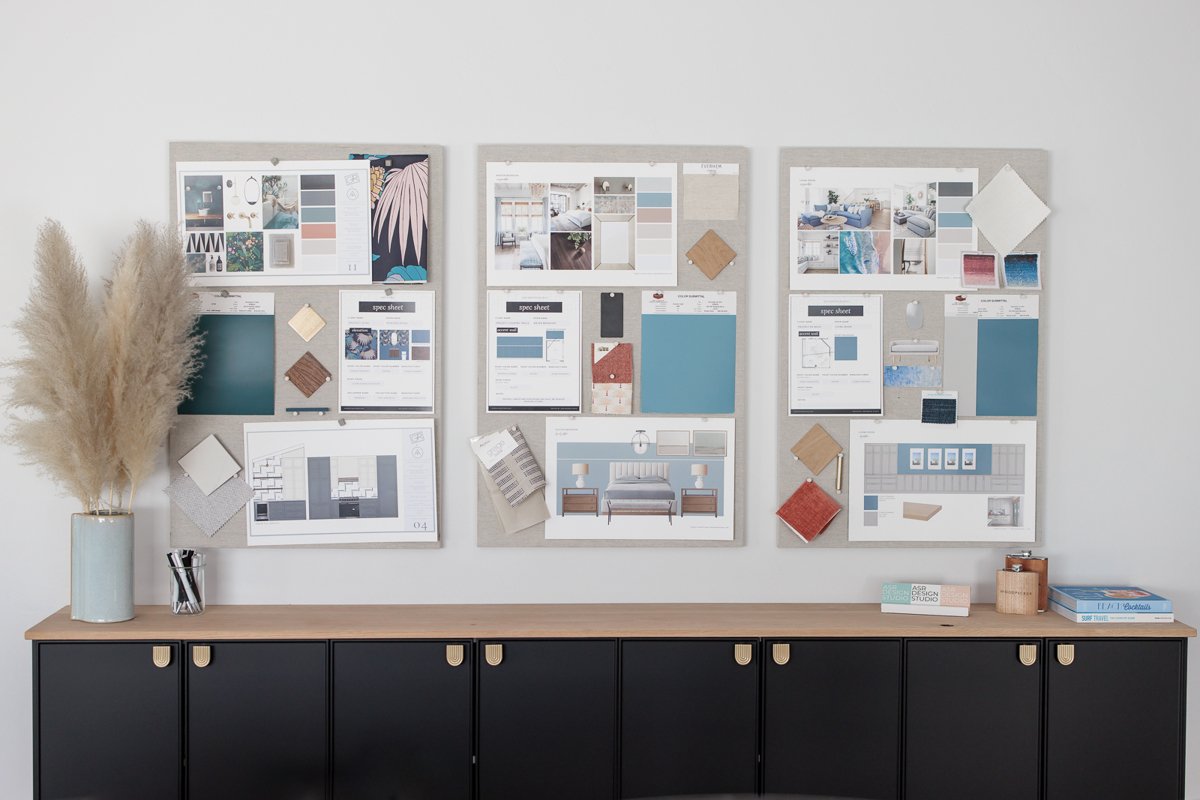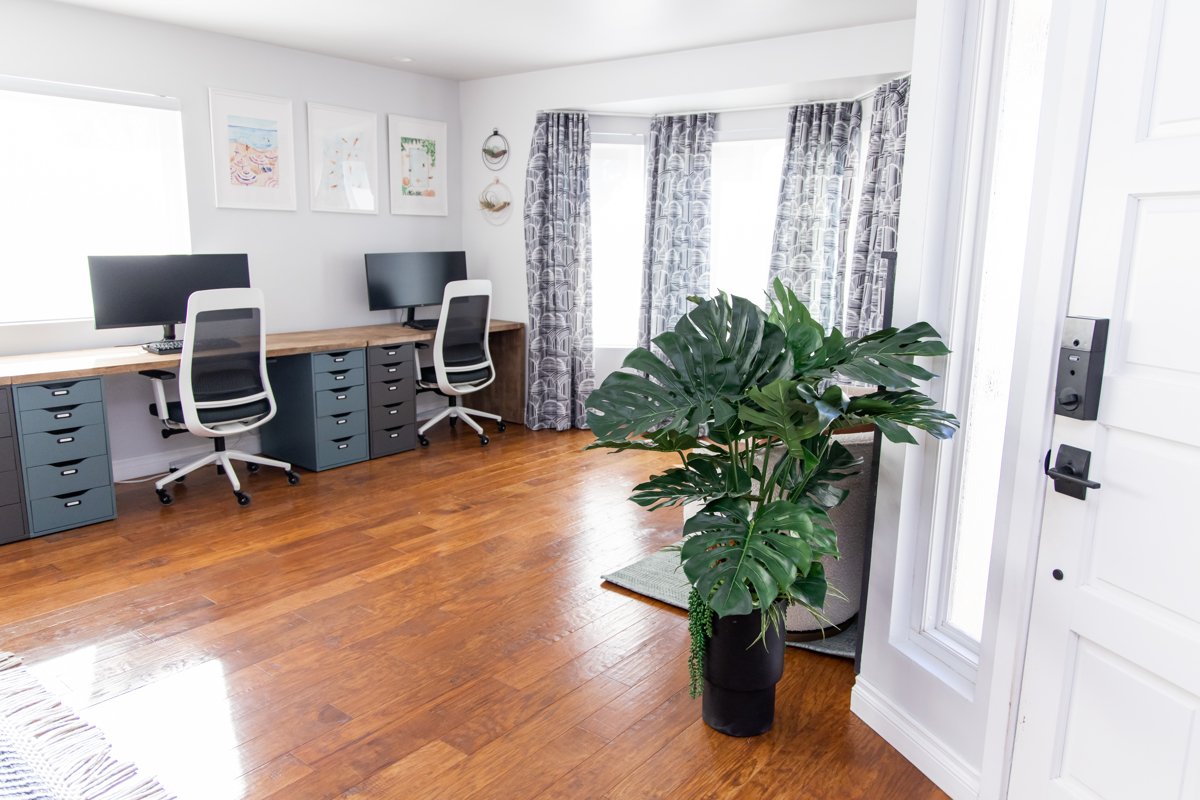10 Essential Tech Tools for Interior Designers
Whether you’re brand new to the biz or a seasoned design pro, there are 10 tech tools we think you’ll love. From time tracking software to calendar management, here are the 10 essential tools for interior designers. Now, not to brag, but we think you’ll be thanking us later!
Let’s dive in!
#1 — Toggl
We use Toggl for time tracking, and it works like a charm. (You can check it out here, btw!) Simply hit start, pause, and stop to keep track of your working hours. You can also label your time entries to see where your time is going.
Use this to make sure you’re spending your time on the important stuff that impacts your bottom line. Or maybe you’ll notice you’re spending way too much time on simple admin stuff. Time to bring in a virtual assistant, stat!
#2 — Asana or Basecamp
We love Asana for backend project management. It keeps us on track and on time. Its only limitation is that you won’t want to use it with your clients. That’s where Basecamp comes in. You can use it to organize stuff on the backend and you can invite your clients in to interact with the project. Choose one to fit your needs and keep your schedule in tip top shape.
If you choose Asana, you can easily email updates to your clients. But if you prefer to communicate with your clients in the project management system, you’ll want to choose Basecamp. Here are some features of each that we love to help you decide:
Asana:
You can create an internal to do list for the design process
You’ll be able to assign items to team members with due dates
You can schedule important dates
You can create subtasks on main tasks
Basecamp:
You’ll have the ability to allow your items to be seen by clients or just by your team
You can create a dedicated client communication thread and share important documents
You’ll be able to create to do lists for clients (we use this for proposals, contracts, investments, spreadsheets, etc.)
You can also create an internal to-do list for your design process
You’ll be able to assign items to team members with due dates
You can schedule important dates and link up cloud services for easy integration
#3 — Dubsado
Dubsado (check it out here!) is what we use for client onboarding. You can create templates for each step of the process for easy to use access over and over, including:
Proposals (that accept payments, too)
Contracts (that sync with the proposal!)
Quizzes
Email Sequences
Calendars
#4 — Ivy/Houzz
There are many apps for accounting, but we love Ivy/Houzz. Keep project budgets on track by using their software. You’ll love how organized it keeps you, and your clients will love to be kept up-to-date on the budget deets (from invoices to purchase orders).
One of our fave parts? Your clients can see all the product you’ve curated for their space and accept or reject each piece.
#5 — quickbooks
Quickbooks will help you keep your own finances in order. Track expenses, revenue, and profit, run reports, and get ready for tax time with their helpful tools.
Some of our favorite features of Quickbooks are:
It syncs with Ivy/Houzz, and other platforms
It streamlines your bookkeeping
It makes sure you’re tracking income, expenses, etc.
It will give you an overview of your business health
It will make it easy to file for state sales tax and annual tax filings
It makes it easy to track who you paid and how much you paid them for filing 1099s
#6 — canva
Perhaps one of our favorite tools, Canva is a powerhouse. Create everything from design presentations to spec sheets to concept boards. (Or visit our template shop for ready-to-go templates you can customize and send off to your clients.)
Among Canva’s many amazing features are:
The ability to create and share templates to use for projects (or to sell!)
You can remove backgrounds on images for easy mood board creation
You can link images right to a website
#7 — AutoCAD
We love AutoCAD, but you can use another space planning app for this, too. The goal is to have accurate floor plans, elevations, etc. to share with your design team and contractors. Not into creating these yourself? Hire it out to a virtual design assistant. (Hey, that’s us!) Learn more about the virtual design assistance we offer right over here.
Some important things to keep in mind about this program are:
You must be trained in it or take courses to understand how to use it
It gives you the ability to create detailed and accurate plans and elevations
It saves you time and gives you improved visualization
It creates accurate plans for construction, minimizing on site errors
It guarantees client satisfaction
It’s used to create permit sets for approval from the city
#8 — Sketchup
SketchUp is the gold standard when it comes to creating 3D models of your clients’ spaces. Again, not your fave thing to do? Hire it out to a virtual design assistant to take it off of your plate.
A few things to note about SketchUp:
It’s easy to learn
You can add in different materials and other models
You’ll have the ability to add in third party apps for photo realistic renderings
#9 — Google Suite
This one’s pretty self-explanatory: We use Gmail and Google Cal within the Google Suite for the basics — emails and calendar management. The simple, straightforward system keeps things easy!
Here’s what we love most about Google Suite:
It can give you a professional email at your domain
Google Drive allows you to store and share files
Google Calendar keeps things super organized, especially when inviting others to meetings
Google Sheets and Docs are easy for sharing
#10 — Zoom
Now for one we all know and love: Zoom. (Well, maybe not love, but it is essential.) We use it for client meetings throughout the project. It’s a great way to keep in touch and share presentations for approvals and thoughts.
We love Zoom for its ability to host many people in a meeting, integrate with your calendar, and for the fact you can take meetings from your phone on the go!





